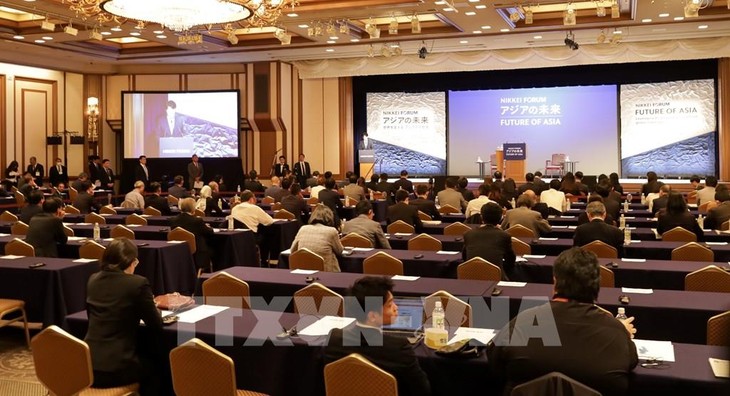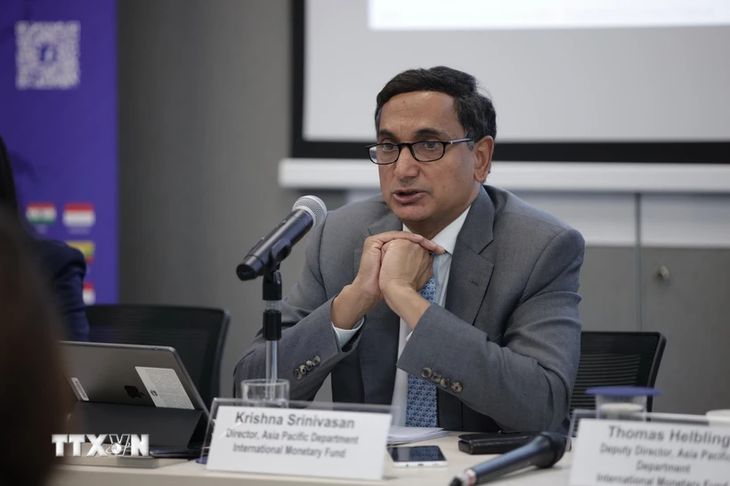(VOVWORLD) - The 29th Nikkei Forum "Future of Asia" will take place on Thursday and Friday in Tokyo, Japan, where leaders from across the region gather to discuss the role Asia should play in an increasingly uncertain world caused by geopolitical instability and climate crisis.
 The 28th Nikkei Forum "Future of Asia" (File photo: VNA) The 28th Nikkei Forum "Future of Asia" (File photo: VNA) |
The Nikkei Forum “Future of Asia” is one of the region's leading annual forums to discuss Asia's economic and political issues.
Economic risks
First held in 1995 by Nikkei, Japan's leading media, financial, and economic group, the Forum "Future of Asia" brings together politicians, business managers, and scholars from Asia-Pacific countries and territories to openly discuss regional issues as well as Asia's role in the world.
This year's Forum will discuss Asian economic outlook, regional cooperation to build a digital ecosystem, Asia's efforts in achieving the net-zero emissions goal, the role of Japan, the US, and South Korea in Northeast Asian security.
The UN’s Economic Outlook report published on May 16th made rather optimistic assessment of the Asian economy, especially in the Northeast Asia and Southeast Asia. The East Asia is expected a growth rate of 4.6% this year and 4.5% next year. The projection is underpinned by strong domestic demand, domestic tourism recovery, and signs of export improvement.
Krishna Srinivasan, Director of the Asia-Pacific Department of the International Monetary Fund (IMF), made an assessment in April: “The momentum carries over into 2024. We now project the region to grow by 4.5 percent in 2024, an upward revision of 0.3 percentage points relative to October. With this, Asia would contribute about 60% of global growth. The region is projected to grow by 4.3 percent in 2025.”
However, many experts believe that there are many factors threatening the growth of Asian economies, especially high interest rates for a long time in many major economies.
Economist Koichi Fujishiro of the Dai-ichi Life Research Institute of Japan said that the strong USD due to the US Federal Reserve (FED) maintaining high interest rates is negatively impacting economic growth of Japan and some other Asian economies which depend heavily on imported energy and food. Therefore, at the Forum, discussions on Asia's more independent economic and monetary policies will be a notable content.
Tauhid Ahmed, CEO of the Indonesian Institute for Economic and Financial Development, said: “The Indonesian government has been implementing some de-dollarization policies. The main issue is agreeing to use the local currency in trade and service transactions. For example, trade between Indonesia and Malaysia and Singapore can use these countries' currencies or rupiah of Indonesia, or trade with China using in Renminbi, instead of USD.”
 Krishna Srinivasan, Director of the Asia-Pacific Department of the International Monetary Fund (Photo: IMF/VNA) Krishna Srinivasan, Director of the Asia-Pacific Department of the International Monetary Fund (Photo: IMF/VNA) |
Future climate risks
Besides economic, technological, and security issues, a major topic at this year's "Future of Asia" Forum is building common mechanisms among Asian countries to respond to the impacts of climate change. The World Meteorological Organization (WMO)’s April 23 Report said that Asia suffered the most natural disasters in the world last year, with huge losses of life and property. According to the report, Asia recorded 79 hydro-meteorological disasters last year. More than 80% of the disasters were floods and storms, claiming more than 2,000 lives. WMO also found that Asia is warming faster than the global average.
Asia experienced the hottest April in history with intense heat waves stretching from South Asia (India, Bangladesh) to East Asia (Thailand, Philippines, Vietnam), while heavy floods occurred in China, the UAE, Oman, and Afghanistan.
Thai conservation scientist Petch Manopawitr said that in the future Asia will have to consider having unlivable areas because of climate change: “Uninhabitable patter is coming. Because we mind not familiar with that, we think that we are fine with the hot weather but now with the temperature and the heat waves, the intensity of long period of hot weather, I think we have to make sure that people about the risks as well.”
Observers say that the presence of the leaders of countries which are experiencing severe heat waves will draw much public attention to discussions on the Asian climate crisis.